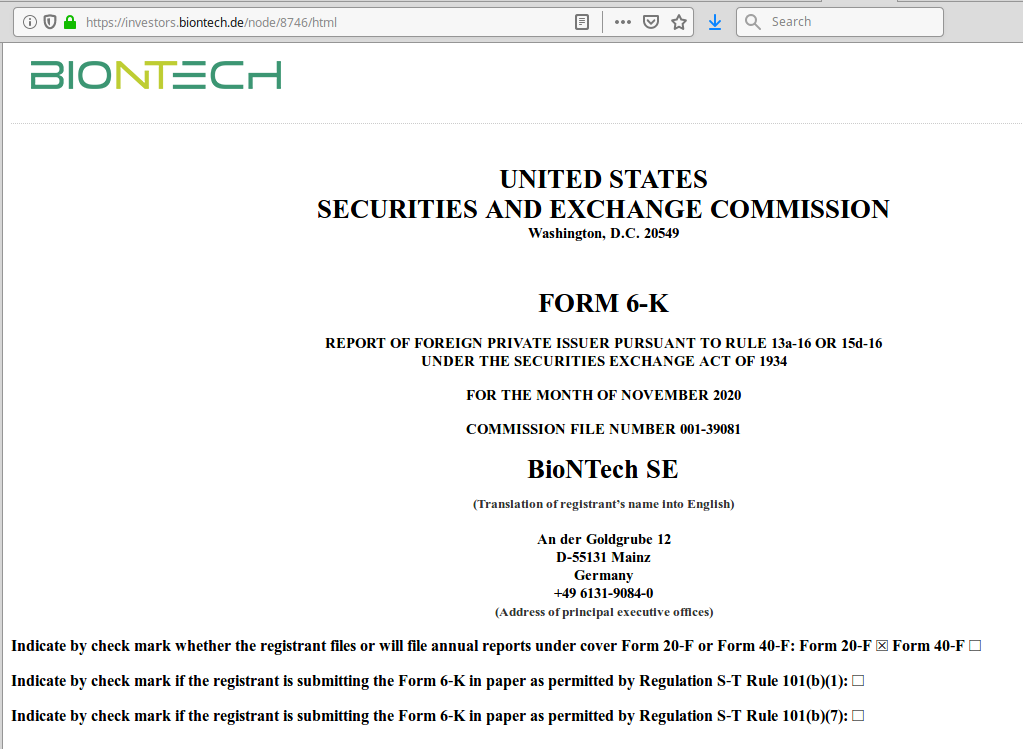BioNtech SEC filing informs us Pfizer-BioNTech COVID-19 mRNA vaccine is the likely cause of new coronavirus variants

Unlike traditional vaccines that have been used for decades against diseases such as measles and polio, COVID-19 vaccines do not contain a weakened or inactive form of the virus itself. Instead, they use messenger RNA (mRNA) to instruct / program the immune system to recognize and react to a component of the coronavirus that is key to its ability to make us sick. BioNTech stated in a SEC filing that the Pfizer-BioNTech COVID-19 vaccine candidate was chosen from one of four vaccine candidate variants based on three distinct (different / a variant) mRNA formats.

In April 2020, we initiated a first-in-human clinical trial program for our BNT162 vaccine program to prevent COVID-19, which includes four vaccine candidate variants based on three distinct (different / a variant) mRNA formats. We are co-developing BNT162 with Pfizer Inc., or Pfizer, worldwide (ex-China) and with Shanghai Fosun Pharmaceutical (Group) Co., Ltd, or Fosun Pharma, in China.

Based on preclinical and clinical data observed to date, we and Pfizer have progressed our BNT162 program into a Phase 2b/3 trial which commenced in late July 2020. For the initial Phase 2b/3 trial, we selected our nucleoside-modified mRNA (modRNA) vaccine candidate variant targeting the 2P-mutated full spike protein, BNT162b2. Both BNT162b2 and our BNT162b1 vaccine candidate, which uses modRNA and encodes the receptor binding domain antigen, received Fast Track status from the FDA. On the basis of data collected and analyzed for BNT162b1 and BNT162b2, including the overall observed safety, tolerability and immunogenicity profiles for each vaccine candidate at different dose levels, along with input from the FDA, we selected BNT162b2 as our lead candidate to take into a Phase 2b/3 trial.
BioNTech SE Quarterly Report for the Three and Nine Months ended September 30, 2020
BioNTech admitted in another SEC filing they may have chosen the wrong messenger RNA (mRNA). By choosing the wrong coded message they caused the body’s immune system to produce a different set of antibodies – a variant. A variant is defined as “a form or version of something that differs in some respect from other forms of the same thing or from a standard.”
In BioNTech SE’s SEC FORM 6-K filing BioNTech SE stated that it and Pfizer chose a “variant” and that:
We cannot guarantee that the BNT162 variant we chose to advance into late stage clinical development will perform better than any of the variants we did not choose to advance. Further, even if we demonstrate a sufficient safety profile for BNT162 we may not be able to demonstrate sufficient efficacy in subsequent trials to obtain regulatory approval.
Based on preclinical and clinical data observed to date, we and Pfizer have progressed our BNT162 program into a Phase 2b/3 trial which commenced in late July 2020. For the initial Phase 2b/3 trial, we selected our nucleoside-modified mRNA (modRNA) vaccine candidate variant targeting the 2P-mutated full spike protein, BNT162b2. Both BNT162b2 and our BNT162b1 vaccine candidate, which uses modRNA and encodes the receptor binding domain antigen, received Fast Track status from the FDA. On the basis of data collected and analyzed for BNT162b1 and BNT162b2, including the overall observed safety, tolerability and immunogenicity profiles for each vaccine candidate at different dose levels, along with input from the FDA, we selected BNT162b2 as our lead candidate to take into a Phase 2b/3 trial.
We cannot guarantee that the candidate variant that we selected will ultimately prove to be the optimal variant. We and Pfizer chose the variant to advance based on our scientific judgment in light of the preclinical and clinical data available to us at the time as to which variant has the best chance for success.

You must be logged in to post a comment Login